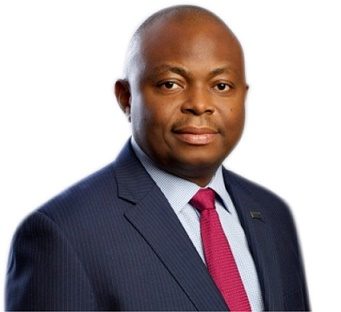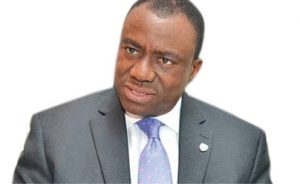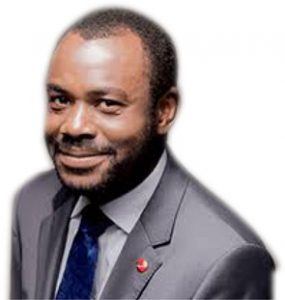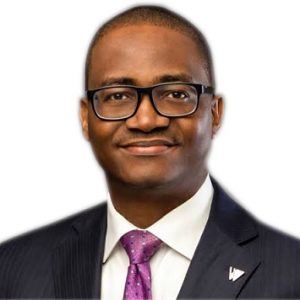Managing Director/CEO, Fidelity Bank Plc
(For his effective loan recovery strategy that built one of the biggest net loan loss write back positions in the banking industry in 2019, Okonkwo is named one of the top 10 bankers of the year, 2019 by The Top10 Magazine.)
Mr. Nnamdi Okonkwo, managing director/CEO, Fidelity Bank Plc, recorded one of the most successful loan recovery campaigns in the banking industry in 2019. It is a star record for him for the second year after cutting down loan impairment expenses to the lowest figure in a decade in 2018.
From a drop of 63 percent in credit loss expenses at the end of 2018, the bank moved forward to a net write back position in 2019. A net loan loss write back of N4.8 billion at the end of the third quarter is a white flag accomplishment for the loan recovery strategist in a situation where many banks still faced huge impairment expenses on financial assets.
By its effect on the income statement, the write back of credit losses was like a windfall for the bank. It was a high rise of 247 percent year-on-year from a net credit loss expense of N3.3 billion in the same period in the prior year.
Fidelity Bank had charged off credit losses in the region of N30 billion in four years to 2018. Recoveries and write backs to profit have been providing the biggest cost saving centre for the bank since 2018. They provided a key operating strength that management applied to keep profit growing for the third year running, as net earnings from the core business failed to drive growth.
Okonkwo added revenue reinforcement to the net loan loss write back advantage. Revenue growth gained momentum in the third quarter with interest income – the main earning line of the bank, accelerating from 7 percent increase at half year to 12 percent at the end of the third quarter. Non-interest income grew more than three times faster at over 39 percent year-on-year and powered a 16 percent growth in gross income at the end of September 2019.
The summary of Fidelity Bank’s earnings story at the end of the third quarter is that management added revenue improvement to credit loss write back. This enabled the bank to gallop over the problem of rising interest expenses and position for profit improvement for the third year in a row.
Rising cost of funds posed a big headache for the bank’s management in the year and this has been the case since 2016. Interest expenses grew ahead of interest earnings almost at a double pace at the end of the third quarter.
Cost of funds claimed an increased share of interest income at over 57 percent compared to less than 52 percent in the same period in 2018. That left net interest income flat at N58 billion, meaning that management was unable to convert the gains in interest income into operating profit.

The bank’s third quarter report as at September 2019 shows gross earnings of N161 billion – a year-on-year growth of about 16 percent. This is an upturn in revenue for the bank from a moderate increase of less than 5 percent in 2018.
Okonkwo was able to tide the bank over the effect of rising interest expenses and post an after tax profit of N21.5 billion at the end of the third quarter. This is an impressive year-on-year growth of 20 percent, accelerating from 15 percent growth at half year. This shows a gain in net profit margin from 12.8 percent to 13.3 percent over the review period.
The full year outlook indicates that another strong growth in profit is to be expected from Fidelity Bank as the 2019 earnings reporting season fast approaches. Management has maintained a record of strong profit improvements since the bank began rebuilding profit after a 30 percent drop in 2016. The bank grew after tax profit by 29 percent to about N23 billion at the end of 2018.
The strength to grow profit ahead of revenue is provided by cost savings, which management has been driving since 2017. Tight cost controls were in place in personnel and other operating expenses, which reinforced the ability to keep profit growing ahead of revenue.
Okonkwo applied cost savings from credit loss and operating expenses to fill up hollows created by interest cost on the income statement. Interest expenses had claimed all the increase in interest income at the end of the third quarter, leaving net interest income flat.
The Fidelity Bank’s CEO built a new strength for the bank in 2019 from improving revenue with improving profit margin. Net profit margin improved from 12 percent at the end of 2018 to 13.3 percent at the end of the third quarter of 2019 – the highest net profit margin for the bank since 2013.
For his effective loan recovery strategy that built one of the biggest net loan loss write back positions in the banking industry in 2019, Okonkwo is named one of the top 10 bankers of the year, 2019 by The Top10 Magazine.
Okonkwo took over the mantle of leadership of Fidelity Bank on 2nd January, 2014. He had a clear definition of what he was to do at the bank. “I would like to be remembered as a CEO that didn’t disappoint his predecessors but took the bank to a greater height than where they left it and also set the stage for whoever is taking over from me to do better”, he said.
Before his appointment, he was executive director of south directorate of the bank where he was in charge of commercial and consumer banking. Fidelity Bank clearly needed someone who knew not only what to do but also the boldness to take on new measures to reinforce the growth momentum after a sharp slowdown in gross earnings and a drop of 58 percent in net profit in 2013.
Okonkwo’s definition of the task ahead was quite reassuring to both shareholders and staff of the bank, providing the confidence that directors needed to forge ahead and the motivational force that staff needed to put on the right spirit for a bank headed for a greater height.
Fidelity Bank’s CEO brought with him a wealth of experience which spans over 30 years in the banking industry covering various key banking operations such as corporate finance, corporate banking, commercial and consumer banking. Before he moved over to Fidelity Bank, he was chief operating officer in the Ghanaian subsidiary of United Bank for Africa. He also worked with Standard Trust, South Africa and Guaranty Trust Bank.
Okonkwo holds a B.Sc. in agricultural economics from the University of Benin and also MBA, banking and finance from Enugu State University of Science and Technology. He is also a graduate of the Advanced Management Program (AMP) of INSEAD.






